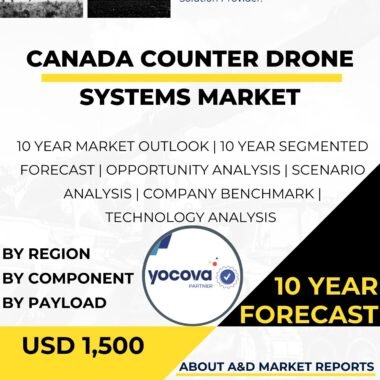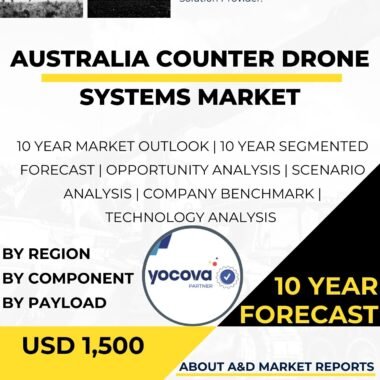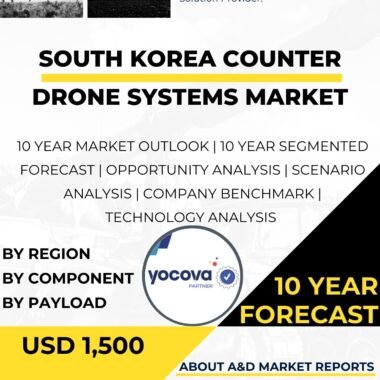Description
Italy counter-drone systems market has been a critical and rapidly growing segment of the country’s defense industry. Counter-drone systems, also known as anti-drone systems or drone defense systems, are designed to detect, track, and neutralize unauthorized drones that pose a threat to security and public safety. With the proliferation of drones and the increased risk of their misuse for malicious purposes, Italy recognizes the importance of investing in advanced counter-drone technologies to protect critical infrastructure, military installations, public events, and other sensitive areas from potential drone threats.
One of the primary drivers of the growth of the counter-drone systems market in Italy is the escalating security concerns related to drone technology. Drones, with their accessibility and versatility, have become increasingly popular for both commercial and recreational purposes. However, this widespread use has also opened up opportunities for misuse, such as carrying out surveillance, smuggling contraband, or launching attacks. As a result, Italy has prioritized the development and acquisition of counter-drone systems to safeguard its airspace and critical assets.
The versatility of Italian counter-drone systems has been a key factor contributing to their popularity. The country’s defense industry has developed a diverse range of counter-drone technologies, including radar systems, radio frequency (RF) detectors, electro-optical/infrared (EO/IR) sensors, and jamming devices. These integrated systems allow for a comprehensive approach to detecting, identifying, and neutralizing unauthorized drones effectively.
Collaborations with global defense contractors and technology providers have been instrumental in advancing Italy’s counter-drone capabilities. Joint ventures, technology transfer agreements, and collaborations with international partners have allowed Italy to access cutting-edge technologies, such as advanced signal processing algorithms, machine learning, and artificial intelligence, to enhance its counter-drone systems’ performance. These collaborations have contributed to the overall effectiveness and reliability of Italian counter-drone solutions, positioning them as competitive options in the global defense market.
Italy’s active role in security and counterterrorism efforts has further emphasized the importance of counter-drone systems. As a member of NATO and other international defense partnerships, Italy collaborates with other nations to address common security challenges. The deployment of advanced counter-drone systems reinforces Italy’s commitment to ensuring airspace security and protecting against emerging threats.
Moreover, Italy’s commitment to securing major public events and sensitive installations, such as airports, government buildings, and critical infrastructure, has driven the need for robust counter-drone measures. Unauthorized drones near these locations can pose significant security risks, and the use of counter-drone systems provides an added layer of protection.
The export potential of Italian counter-drone systems has been another significant driver of growth. As Italy continues to develop and produce advanced counter-drone technologies, it has emerged as a reliable exporter to other nations seeking to enhance their drone defense capabilities. The export of counter-drone systems not only boosts Italy’s defense industry but also contributes to its economic growth and reinforces its presence in the global counter-drone market.
Challenges in the counter-drone systems market include addressing the evolving nature of drone threats and ensuring compliance with regulations. The development of counter-drone systems requires continuous innovation and adaptation to keep up with the changing drone technology landscape. Italy’s defense industry must stay at the forefront of research and development to address new drone capabilities, such as autonomous drones or swarms.
Additionally, counter-drone systems must adhere to strict regulations and international airspace guidelines to prevent any interference with legitimate drone operations or commercial aviation. Italy must ensure that its counter-drone technologies are well-tested and authorized for use in various environments while adhering to legal and ethical considerations.
As Italy looks to the future, the counter-drone systems market is expected to continue its growth trajectory, driven by ongoing security challenges and the country’s commitment to maintaining a secure airspace. The development of new counter-drone technologies, advancements in sensor capabilities, and improvements in data analytics and threat assessment are likely to be the focus of Italy’s counter-drone systems market in the coming years.
In conclusion, the Italy counter-drone systems market has been a crucial and rapidly expanding segment, reflecting the country’s commitment to ensuring airspace security and countering potential drone threats. Indigenous development, international collaborations, and a focus on versatility and innovation have all contributed to Italy’s strong position in the global counter-drone market. As Italy continues to invest in research and development, the counter-drone systems market is poised for further growth, ensuring Italy’s readiness and effectiveness in meeting the challenges of drone technology and contributing to international security efforts.




